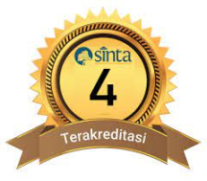IMPLEMENTATION OF SCIENCE LEARNING INTEGRATED ISLAMIC VALUE ON CONCEPT MASTERY: SYSTEMATIC REVIEW
Abstract
References
A. Ilhami, N. Zein, Z. Zulfahmi, and ..., “Implementing of Islamic Learning Integrated in Biology Education through Team Teaching Method to Enhance Students' Understanding of Sex Education,” … J. , vol . 5, no. 1, pp. 46–55, 2021, [Online]. Available: http://bioeducation.ppj.unp.ac.id/index.php/bioedu/article/view/315
TE Anggraeni and M. Mundilarto, "The Development of Local Wisdom-Based Physics Cognitive Ability Assessment Instrument for Senior High School Students," J. Researcher. and Science Learning , vol. 6, no. 1, p. 102, 2020, doi: 10.30870/jppi.v6i1.5718.
J. Sahil, A. Haerullah, and J. Pagala, "Integrated Natural Science Learning Integrated with Islamic Values as a Solution to Improve Student Learning Outcomes in Grade VII Madrasah Tsanawiyah Friends of Scholars, Ternate City," vol. 12, no. 2, p. 10, 2021.
L. Pradipta, J. Bahari, M. Kafrawi, P. Studi, T. Physics, and U. Islam, “2549- 6158,” pp. 40–47, 2021.
A. Harahap and A. Darmana, "PBL Learning Using Teaching Materials Integrated Spiritual Values to Improve Learning Outcomes and Spiritual Attitudes," J. Inov. Kim's study. , vol. 2, no. 2, p. 64, 2020, doi: 10.24114/jipk.v2i2.19393.
NG Utama, H. Rahmatan, and A. Azhar, "Implementation of Learning Cycle Based LKPD 5E Integrated Islamic Values on Student Learning Outcomes in Junior High School," J. Educator. Indonesian Science. , vol. 7, no. 1, pp. 47–54, 2020, doi: 10.24815/jpsi.v7i1.13550.
IS Zega and A. Darmana, "Implementation of Islamic Values Integrated Salt Hydrolysis Teaching Materials with Problem Based Learning Model to Improve Student Learning Outcomes in terms of Student Interests," J .Inov. Kim's study. , vol. 1, no. 2, p. 64, 2019.
BA Fauzan, SF Akbar, D. Kusnadi, and A. Sofyan, “Changes in Students' Cognitive Abilities through STEM-Based Learning in Elementary Schools,” Mosharafa J. Educators. Matt. , vol. 12, no. 1, pp. 89–100, 2023, doi: 10.31980/mosharafa.v12i1.2122.
A. Yolanda, "The Effect of Integrated Digital Modules on Islamic Values on Student Learning Outcomes in the Concept of Regular Circular Motion," 2020, [Online]. Available: http://repository.uinjkt.ac.id/dspace/handle/123456789/52276
D. Nihayah, Application of Islamic Values in Environmental Pollution Materials Through the Surrounding Natural Exploration (JAS) Approach to Increase Motivation and Learning Outcomes in Science at MTs An-Najah During the 2019/2020 Academic Year . 2020.
F. Paramahita, "The Influence of Mobile Learning Learning Media on Students' Cognitive Ability in the Integrated Solar System Concept ...," Repository.Uinjkt.Ac.Id , 2022, [Online]. Available: https://repository.uinjkt.ac.id/dspace/handle/123456789/60737%0Ahttps://repository.uinjkt.ac.id/dspace/bitstream/123456789/60737/1/Skripsi_Fahira Paramahita.pdf
U. Dari, A. Halim, and S. Ilyas, "Influence of the Use of the Approach of Blended Learning Model Rotation Based Moodle on Motivation and Cognitive Abilities of Students in the Subjects of Physics," J. Researcher . Educator. IPA , vol. 8, no. 1, pp. 195–202, 2022, doi: 10.29303/jppipa.v8i1.1100.
R. Wardiah, G. Science Middle School, H. Tinggi, and K. Padang Lawas, "Application of the Discovery Learning Model to Improve Student Learning Outcomes in Class VIII on Excretion System Material at SMP Negeri 1 Hutaraja Tinggi," J. ESTUPRO , vol. 5, no. 2, p. 145, 2020.
N. Fauziah, AR Prasetyo, ER Kustanti, P. Crescenzo, and S. Suryanto, "Drum rhythm therapy: An intervention to stimulate the cognitive abilities of children with Autism Spectrum Disorder (ASD)," Psychohumanities J. Researcher . Psycho. , vol. 7, no. 2, pp. 211–230, 2022, doi: 10.21580/pjpp.v7i2.11837.
P. Model et al. , “Omicron Journal,” vol. x, no. x.
N. Ihsani, A. Al Idrus, and J. Jamaludin, "Problem-Based Biology Learning Devices Integrated with Islamic Values to Improve Students' Mastery of Concepts," J. Pijar Mipa , vol. 15, no. 2, pp. 103–109, 2020, doi: 10.29303/jpm.v15i2.1326.
B. Bunt, “Using artificial life simulations to enhance reflective critical thinking among teacher students,” vol. 6, 2020.
RP Gumilar and S. Wardani, "The Implementation of Guided Inquiry Learning Models on The Concept Mastery, Scientific Attitude, and Science Process Skill," J. Prim. educ. , vol. 8, no. 5, pp. 148-`154, 2019.
AR Bakri, S. Sutrisno, and Q. Mushafanah, "Student Character Values in Extracurricular Activities," Indones. Educational Character Values. J. , vol. 4, no. 1, pp. 1–6, 2021, doi: 10.23887/ivcej.v4i1.29811.
NNP Hartayani and IGAA Wulandari, “Improving the Creative Character of Elementary School Students Through Tri Hita Karana Habituation,” Indones. Educational Character Values. J. , vol. 5, no. 2, pp. 67–76, 2022, doi: 10.23887/ivcej.v5i2.49938.
RD Novitasari, A. Wijayanti, and FP Artharina, "Analysis of the Application of Strengthening Character Education as the Implementation of the 2013 Curriculum," Indones. Educational Character Values. J. , vol. 2, no. 2, p. 79, 2019, doi: 10.23887/ivcej.v2i2.19495.
DOI: http://dx.doi.org/10.24036/14775171074








